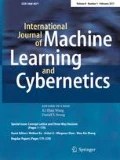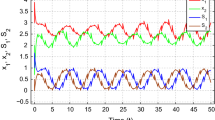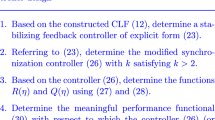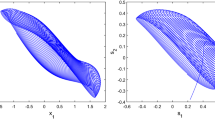Abstract
In this paper, the synchronization problem for a class of competitive neural networks with different time scales and time-varying delay is investigated. A novel delay partitioning approach is developed to derive a delay-dependent condition guaranteeing the response system can be synchronized with the drive system. The design of the gain matrix of the linear feedback controller can be achieved by solving a linear matrix inequality. By constructing a novel Lyapunov–Krasovskii functional, which can guarantee the new synchronization conditions to be less conservative than those in the literature. This paper also presents an illustrative example and uses simulated results of this example to show the feasibility and effectiveness of the proposed scheme.




Similar content being viewed by others
References
Amari S (1983) Field theory of self-organizing neural nets. IEEE Trans Syst Man Cybern 13:741–748
Balasubramaniam P, Chandran R (2011) Delay decomposition approach to stability analysis for uncertain fuzzy Hopfield neural networks with time-varying delay. Commun Nonlinear Sci Numer Simul 16:2098–2108
Balasubramaniam P, Nagamani G (2011) A delay decomposition approach to delay-dependent passivity analysis for interval neural networks with time-varying delay. Neurocomputing 74:1646–1653
Balasubramaniam P, Chandran R (2011) Robust asymptotic stability of fuzzy Markovian jumping genetic regulatory networks with time-varying delays by delay decomposition approach. Commun Nonlinear Sci Numer Simul 16:928–939
Balasubramaniam P, Sathy R, Rakkiyappan R (2011) A delay decomposition approach to fuzzy Markovian jumping genetic regulatory networks with time-varying delays. Fuzzy Sets Syst 164:82–100
Boyd S, EI Ghaoui L, Feron E, Balakrishnan V (1994) Linear matrix inequalities in system and control theory. SIAM, Philadelphia
Chen C (2011) Structural vibration suppression by using neural classifier with genetic algorithm. Int J Mach Learn Cybern. doi:10.1007/s13042-011-0053-9
Chen J, Jiao L, Wu J, Wang X (2010) Projective synchronization with different scale factors in a driven-response complex network and its application in image encryption. Nonlinear Anal RWA 11:3045–3058
Chen W, Zheng W (2007) Delay-dependent robust stabilization for uncertain neutral systems with distributed delays. Automatica 43:95–104
Du B, Lam J (2009) Stability analysis of static recurrent neural networks using delay-partitioning and projection. Neural Netw 22:343–347
Faugeras O, Grtimbert F, Slotine JJ (2008) Absolute stability and complete synchronization in a class of neural fields models. SIAM J Appl Math 69:205–250
Gan Q, Xu R, Kang X (2012) Synchronization of unknown chaotic delayed competitive neural networks with different time scales based on adaptive control and parameter identification. Nonlinear Dyn 67:1893–1902
Grossberg S (1976) Adaptive pattern classification ad universal recording. Biol Cyrbern 23:121–134
Gu H (2009) Adaptive synchronization for competitive neural networks with different time scales and stochastic perturbation. Neurocomputing 73:350–356
Gu K (2000) An integral inequality in the stability problem of time-delay system. In: Processings of 39th IEEE conference on decision and control, pp 2805–2810
Hale J, Verduyn Lunel SM (1993) Introduction to functional differential equations. Springer, New York
He Y, Wu M, She JH, Liu G (2007) Further improvement of free-weighting matrices technique for systems with time-varying delay. IEEE Trans Autom Control 52:293–299
He Y, Wang Q, Xie L, Lin C (2004) Delay-dependent robust stability criteria for uncertain neutral systems with mixed delays. Syst Control Lett 51:57–65
Li X, Zhu X (2008) Stability analysis of neutral systems with distributed delays. Automatica 44:2197–2201
Li Z, Liu H, Gao H (2011) A delay partitioning approach to H ∞ filtering for continuous time-delay systems. Circuits Syst Signal Process 30:501–513
Lou X, Cui B (2007) Synchronization of competitive neural networks with different time scales. Physica A 380:563–576
Lu H, He Z (2005) Multistability of competitive neural networks with time-varying and distributed delays. Neural Netw 18:243–250
Mai H, Liao X, Li C (2009) A semi-free weighting matrices approach for neutral-type delayed neural networks. J Comput Appl Math 225:44–55
Meyer-Bäse A, Ohl F, Scheich H (1996) Singular perturbation analysis of competitive neural networks with different time scales. Neural Comput 8:1731–1742
Meyer-Bäse A, Pilyugin SS, Chen Y (2003) Global exponential stability of competitive neural networks with different time scales. IEEE Trans Neural Netw 14:716–719
Meyer-Bäse A, Pilyugin SS, Wismuler A, Foo S (2004) Local exponential stability of competitive neural networks with different time scales. Eng Appl Artif Intell 17:227–232
Mou S, Gao H, Lam J, Qiang W (2008) A new criterion of delay-dependent asymptotic stability for Hopfield neural networks with time delay. IEEE Trans Neural Netw 19:532–535
Mou S, Gao H, Qiang W, Chen K (2008) New delay-dependent exponential stability for neural networks with time delay. IEEE Trans Syst Man Cybern B 38:535–571
Parlakci M (2007) Robust stability of uncertain neutral systems: a novel augmented Lyapunov functional approach. IET Control Theory Appl 1:802–809
Park JH (2009) Synchronization of cellular neural networks of neutral type via dynamic feedback controller. Chaos Solitons Fractals 42:1299–1304
Peng C, Tian Y (2008) Delay-dependent robust stability criteria for uncertain systems with interval time-varying delay. J Comput Appl Math 214:480–494
Sandoval AC, Yu W, Li X (2006) Some stability properties of dynamic neural networks with different time-scales. In: International joint conference on neural networks, pp 8334–8340
Sarlin P (2011) Visual tracking of the millennium development goals with a fuzzified self-organizing neural network. Int J Mach Learn Cybern. doi:10.1007/s13042-011-0057-5
Wang X, Li C (2008) A definition of partial derivative of random functions and its application to RBFNN sensitivity analysis. Neurocomputing 71:1515–1526
Wu Z (2012) Cluster mixed synchronization via pinning control and adaptive coupling strength in community networks with nonidentical nodes. Commun Nonlinear Sci Numer Simul 17:1628–1636
Yuan K, Cao J (2006) Periodic oscillatory solution in delayed competitive-cooperative neural networks: a decomposition approach. Chaos Solitons Fractals 27:223–231
Zhang C, He Y, Wu M (2010) Exponential synchronization of neural networks with time-varying mixed delays and sampled-data. Neurocomputing 74:265–273
Zheng H, Wang H (2011) Improving pattern discovery and visualisation with self-adaptive neural networks through data transformations. Int J Mach Learn Cybern. doi:10.1007/s13042-011-0050-z
Zhu Q, Cao J (2010) Adaptive synchronization of chaotic Cohen-Crossberg neural networks with mixed time delays. Nonlinear Dyn 61:517-534
Zhu Q, Cao J (2011) Adaptive synchronization under almost every initial data for stochastic neural networks with time-varying delays and distributed delays. Commun Nonlinear Sci Numer Simul 16:2139–2159
Acknowledgments
This work was supported by the National Natural Science Foundation of China (Nos. 10671209 and 11071254) and the Scientific Research Foundation for the Returned Overseas Chinese Scholars, State Education Ministry.
Author information
Authors and Affiliations
Corresponding author
Rights and permissions
About this article
Cite this article
Gan, Q. Synchronization of competitive neural networks with different time scales and time-varying delay based on delay partitioning approach. Int. J. Mach. Learn. & Cyber. 4, 327–337 (2013). https://doi.org/10.1007/s13042-012-0097-5
Received:
Accepted:
Published:
Issue Date:
DOI: https://doi.org/10.1007/s13042-012-0097-5




